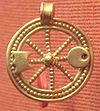
Nabia (or Navia) was a goddess of the Pre-Roman peoples of the Iberian Peninsula, although she also had an extended cult during the Roman occupation of the peninsula.
Nabia was worshipped in many places on the Iberian Peninsula, sometimes in very different ways, leading some historians to suggest that "Nabia" was just a common word used by different peoples to refer to their deities (a theory questioned by others). Due to the uncertainty of her nature, she is sometimes interpreted as a water deity, other times she is associated with valleys, forests and hills, and she's further seen as the goddess of fertility, health, and abundance.
References
- ^ FERREIRA, Daniela. Os Deuses foram honrados, 2022.
- Estudios sobre la tabula siarensis, Anejos de Archivo Español de Arqueología IX, Madrid, 1988, p. 264.
- MELENA, José L. Un ara votiva romana en el Gaitán, Cáceres, 1984.
- Los Dioses de la Hispania Céltica, Madrid, 2002.
- "Um balneário com 3 mil anos". Público. 2007-02-28.
Further reading
- Olivares Pedreño, Juan Carlos. "El culto a Nabia en Hispania y las diosas polifuncionales indoeuropeas". In: Lucentum, ISSN-e 1989-9904, Nº 17-18, 1998-1999, págs. 229-242. ISSN 0213-2338.
- Prósper, Blanca María [es]. "El nombre de la diosa lusitana Nabia y el problema del betacismo en las lenguas del occidente peninsular". In: Ilu 2 (1997): 141-149.
| Celtic mythology series | ||
|---|---|---|
| Ancient deities of Gaul, Britain and Gallaecia by region | ||
| Supra-regional |
|   |
| Britannia | ||
| Gallia Aquitania | ||
| Gallia Belgica | ||
| Gallia Celtica | ||
| Gallia Cisalpina | ||
| Gallia Narbonensis | ||
| Germania Inferior | ||
| Gallaecia | ||
This article relating to a European folklore is a stub. You can help Misplaced Pages by expanding it. |
This article about Portuguese history is a stub. You can help Misplaced Pages by expanding it. |